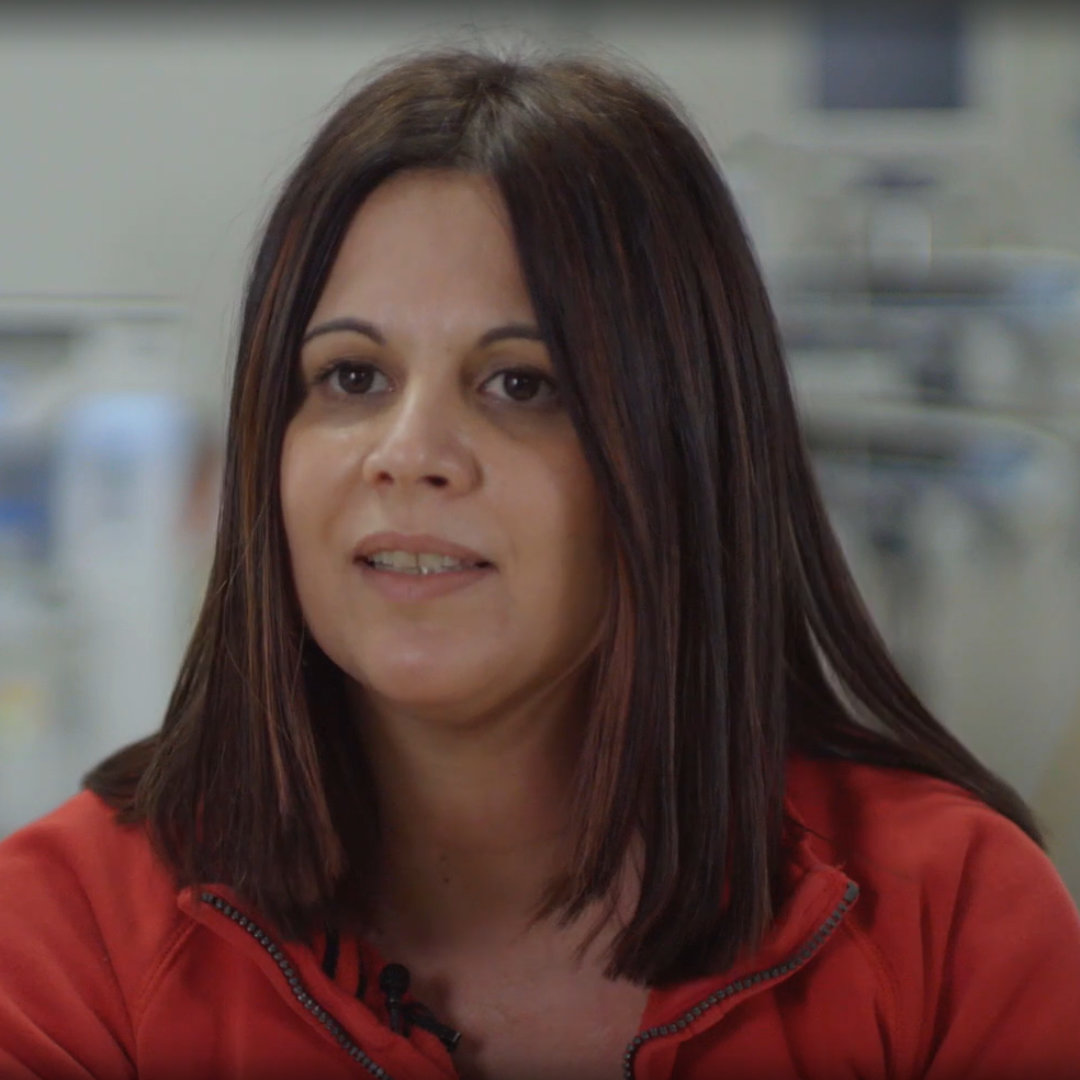
Nursing Care During Brachytherapy
Healthcare Perspective
Nurse Sara Scalise
Sara Scalise is a coordinating nurse for the interventional radiology (also known as brachytherapy) department at Fondazione Policlinico Universitario “Agostino Gemelli” IRCCS in Rome, Italy. In this video, she shares her experience working with a dedicated team of specialists, her role in taking care of patients, and how she builds trust with each of them to ease their anxiety as they are stepping to get brachytherapy treatment.

Emotional Management
Getting a cancer diagnosis is overwhelming and patients will experience anxiety throughout their care pathway. The oncology nurses can become a great support to help alleviate stress and reduce the burden of undergoing treatment.
With years of experience as a coordinating oncology nurse for brachytherapy procedures, Sara knows her patients very well. She is empathetic to how they feel, especially on the day of the treatment. Each time a patient enters the room to get the therapy, she can read the fear on their faces. Sara genuinely understands their emotions. Being nervous is common, it’s natural and even expected. Through empathy and humanity, Sara is dedicated to helping her patients navigate one of the most challenging times of their lives.
Supporting Patients
While Sara's main role as an oncology nurse is supporting with the cancer treatment and supporting with symptom management, a lot of Sara's role involves supporting and advocating for her patients.
Oncology nurses treat patients throughout their brachytherapy treatments by following the treatment plan set by the oncologist, support their cancer patients and their loved ones by answering questions, and bringing compassion to their roles.
A crucial part of cancer care is holistic cancer treatment, which means that the oncology nurse plays an important role with regards to physical and emotional support for the best outcomes.
While other healthcare providers manage much of the cancer treatments through assessing patients pre and post brachytherapy, putting together the treatment plan and communicating with other specialists, oncology nurses work directly with the patient and are a necessary component to patient management.
Your Brachytherapy Nurse Coordinator's Role
The oncology nurse coordinators play an important role in orchestrating the care of cancer patients.
The role of a brachytherapy nurse coordinator includes:
- Patient education: The oncology nurse coordinator educates patients about brachytherapy and what to expect during the treatment process. This may include information about the procedure, potential side effects, and self-care instructions.
- Treatment planning: The nurse coordinator works closely with the radiation oncologist to plan the brachytherapy treatment, including selecting appropriate radioactive sources and determining the length and frequency of treatment.
- Coordination of care: The nurse coordinator coordinates care for the patient, including scheduling appointments, patient assessment and arranging for any necessary tests or procedures as part of the cancer care. They may also collaborate with other healthcare providers, such as radiation therapists and oncology nurses, to ensure a seamless patient experience.
- Support for patients and families: The nurse coordinator provides emotional support to patients and their families throughout the cancer treatments, helping them to cope with the stress and uncertainty of a cancer diagnosis.
- Follow-up care: The nurse coordinator helps to ensure that patients receive appropriate follow-up care after the brachytherapy treatment is complete, including monitoring for any potential side effects and scheduling any necessary imaging or tests.
Oncology Nurses Role During Cancer Treatment
Alongside the emotional management of cancer treatments, oncology nurses are the first port of call for any issues cancer patients have during their treatment period.
Oncology nurses assess and manage any side effects, such as fatigue, allergic reactions, gastrointestinal issues or anything else you may experience. This can include liaising with a consultant to receive prescriptions, to symptom management through other means.

Radiation Safety
Radiation safety is a crucial component of brachytherapy, and oncology nurses play a vital role in ensuring that patients and healthcare professionals are protected from unnecessary exposure to radiation.
Oncology nurses monitor the patient's exposure to radiation during the brachytherapy procedure. This includes calculating the dose of radiation the patient will receive and monitoring the equipment to ensure the correct amount of radiation is delivered to the tumor site. They also work with radiation physicists and radiation safety officers to ensure the correct procedures are followed and all necessary safety measures are in place.
Additionally, oncology nurses handle and dispose of radioactive sources used in brachytherapy, which require careful handling to prevent radiation exposure. They must be trained in handling and disposing of radioactive materials to ensure the safety of the patient and the healthcare team.
Finally, oncology nurses implement safety measures to protect the patient and healthcare team during the brachytherapy procedure. This includes wearing protective equipment such as lead aprons and gloves, as well as implementing procedures to ensure the safe transport of radioactive sources and equipment.
Post Brachytherapy Management
Wound care is an essential aspect of brachytherapy, as it often involves the placement of catheters or applicators into the body. These devices can cause wounds or tissue damage that requires careful management to prevent infection and promote healing. Oncology nurses are trained to provide wound care and ensure proper hygiene practices, such as using sterile techniques when changing dressings, monitoring the wound for signs of infection, and providing patient education on how to care for their wounds at home.
In addition to wound care, oncology nurses are responsible for managing medications for brachytherapy patients. This includes administering and monitoring medications that may be prescribed to manage pain, anxiety, or other symptoms related to the patient's cancer or treatment. Oncology nurses may also be responsible for providing patient education on medication administration, including how to take medications safely and effectively and how to manage any potential side effects.
Medication management in brachytherapy is particularly important because radiation therapy can cause a range of side effects, such as nausea, vomiting, and fatigue, which may require medication to manage. Patients may also require medication to manage pain or anxiety related to the procedure or to manage side effects related to the placement of catheters or applicators.
Supporting Patients
Sara is proud to be an oncology nurse and believes that a large part of her role is being empathetic and supporting her patients as best she can, ensuring their cancer treatment plan is followed and she works with many patients and their families to support them on their journey.
Gain additional insights into brachytherapy by exploring the perspectives of other healthcare professionals or by watching interviews with our patients.
